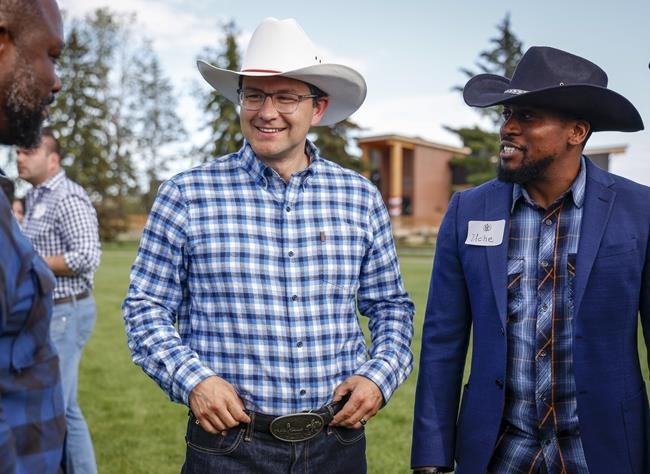OTTAWA — One could say Pierre Poilievre has grown up on Parliament Hill. Elected as a member of Parliament at just 25, he quickly earned a reputation for being a political pit bull with his ideologically-driven, combative performances in debates. He is deeply popular among the Conservatives' grassroots and over the years has amassed one of the largest social media followings of any Canadian politician.
Born: Poilievre was born June 3, 1979. He was adopted by his parents Marlene and Don Poilievre, teachers from Saskatchewan who were married two years earlier and moved to Calgary. Poilievre says he was born in Calgary to a 16-year-old girl who couldn't raise a child and whose own mother had died recently. He has a brother named Patrick.
Early years: Poilievre says he had a normal, middle-class childhood. His parents divorced when he was a teenager and he spent his youth playing competitive sports such as football, hockey and wrestling. He says when a bout of tendinitis in his shoulder left him recovering at home, he asked his mother if he could join her at a Progressive Conservative meeting. Thus his love for politics was born.
Before politics: After graduating high school, he went to the University of Calgary, where he earned an undergraduate degree in international relations. But politics was never far away — the young Poilievre served as president of his campus Conservative club. He went to Ottawa in 2002 to work as a political staffer for Stockwell Day, then a member of the Canadian Alliance. Poilievre also briefly ran a political consulting firm with friend and former Alberta cabinet minister Jonathan Denis in his early 20s.
Political record: As a newly elected MP for the newly formed Conservative Party of Canada, Poilievre advocated for local issues, such as trying to prevent Ottawa's Queensway Carleton Hospital from being charged rent by the National Capital Commission. He railed against the Liberal government's proposal to introduce national daycare. In 2005, he voted with the rest of the party's caucus against expanding the traditional definition of marriage to include same-sex unions. After Conservatives won power in 2006, he was appointed as a parliamentary secretary, first to the Treasury Board president and later to then-prime minister Stephen Harper. He was often called to defend the government's decisions. He was tapped for a cabinet post after the Conservatives won a majority in 2011, becoming minister of democratic reform, in charge of bringing in controversial changes to federal election laws. He became employment minister in 2015, just before the Conservatives lost power. As an opposition MP, Poilievre has served as the party's finance critic, except for a brief period in 2021 under Erin O'Toole.
Family: Poilievre and his wife, Anaida, eloped in Portugal in 2017. They met in Ottawa, where she was working as a political staffer. Together, they have two children, Valentina and Cruz.
Quote: Poilievre's advice to young conservatives at a conference in 2009 about the value of learning to communicate: "The voters do not have any responsibility to spend their time deciphering your Latin."
This report by The Canadian Press was first published Sept. 5, 2022
Stephanie Taylor, The Canadian Press
Note to readers: This is a corrected story. A previous version said Poilievre and his wife were married in 2018. They were, in fact, married in 2017.

